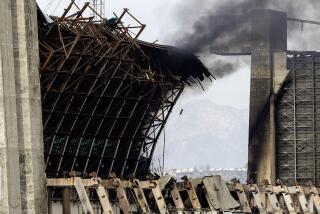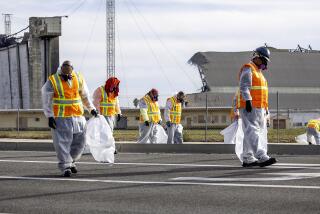A New Life After Military Service
- Share via
The military officers and their families who lived at the Tustin Marine base left four years ago. On Tuesday, movers finally came for their appliances.
Volunteers for Habitat for Humanity plucked refrigerators, stoves and water heaters from rows of apartments on the closed base and loaded them onto a truck.
The appliances were headed to Habitat’s store in Santa Ana, where they will be sold to raise funds for the nonprofit group, which builds homes for low-income families.
As developers begin the task of transforming the 1,600-acre former helicopter base into homes and businesses, they must find ways to dispose of what the Marines left behind, including the buildings and their contents.
For John Laing Homes, which bought a 37-acre parcel this year, it meant tearing down 278 apartments used by the officers and their families.
All the units still had working appliances. John Laing’s waste was Habitat’s gain.
It also meant that nearly 65 tons of potential trash would not go to local landfills, said Jason Mckinstry, a Habitat official. “It is a win for everyone.”
Habitat has already raised almost $40,000, Mckinstry said, by recycling materials -- including doors and windows -- in other development projects at the base.
The group’s Santa Ana shop, ReStore, sells recycled building materials and appliances, Mckinstry said.
Navy officials said that they do not keep statistics on the issue but that it is common for developers to donate useful materials to local charities when redeveloping former military facilities.
Mckinstry said his group will also approach developers of land at the closed El Toro Marine base, which the Navy plans to auction next year.
In the John Laing Homes project in Tustin, the developer will level the military apartments and build 189 single-family homes near Harvard and Edinger avenues. The company has another project at the base for 376 homes, but that site had no existing buildings.
John Laing’s vice president of planning and development, Ken Nishikawa, said there were several opportunities to recycle. “Even the asphalt can be crushed and recycled,” he said. “We are not talking about huge savings, but it is a good opportunity to cut down on truck trips and such.”
The company will also replant almost 30 trees that had lined the military roads.
On Tuesday, the Habitat volunteers removed some of the last Gibson Frost Clean Energy Savers and Tappan gas stoves from the apartments. Despite being mothballed for four years, the apartments were in excellent condition.
“It was pretty amazing,” said Peter Major, executive director of Habitat for Humanity of Orange County. “It looked like they had just moved out last week.”
Inside one unit, volunteer Mo Ahn, 27, and Habitat employee Fernando Sillas, 22, were removing a refrigerator.
“Look,” Ahn said. “A brand-new pack of cigarettes. It is not even opened.”
Sillas handled the pack and then was told that it had probably been there four years.
“I better just leave it here,” he said.
More to Read
Sign up for Essential California
The most important California stories and recommendations in your inbox every morning.
You may occasionally receive promotional content from the Los Angeles Times.









